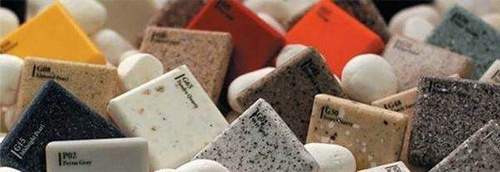home > Acrylic stone or quartz agglomerate?
Artificial stone today increasingly displaces traditional materials that are used to create countertops, sinks, window sills and other interior elements. Composite material in the manufacture of such products are acrylic or quartz stone.

What kind of finish to give preference to depends not only on the price, although artificial stone is always cheaper than natural. In each case, there are economy options (for example, Czech quartz) or its elite counterpart to natural stone from the USA.
It is even more difficult with an acrylic stone, which can be considered more expensive than quartz if the manufacturer sees his product as super-elite in the super-elite segment. Some companies are just entering the market, others have already conducted market research and are increasing sales of slabs.
Before making a choice, quartz or acrylic, it is necessary to study the possibilities of materials.
Quartz Agglomerate
Nobody disputes the advantage of quartz over natural stone, but when compared with other artificial material?
- Despite the variety of shades, you can choose a countertop of a strictly defined color, even if it is not monolithic.
- Quartz stone is environmentally friendly, there is no natural radiation background in it.
- The third strength material quietly withstands mechanical loads, avoiding surprises in the form of chips and scratches.
- For all its hardness, quartz has a good ability to bend. some parts are mounted not only on a case basis, but also on legs or other support.
- The material is resistant to acid aggression and temperature fluctuations, does not absorb odors, fat, water, while maintaining the effect of the novelty of the coating.
- Quartz allows you to cut a hole for washing. invoice or with a lower adhesive, suitable for installing the hob.
- The life of a quartz stone is unlimited: it will outlive its owner.
Video: Synthetic Marble Countertop Than Cut
Among the shortcomings of quartz stone can be noted:
- The presence of seams if the surface of the countertop exceeds the length of a standard plate (1.4. 3.05 m). Joints are filled with glue and colored pigment.
- The thickness of the quartz countertop is 2-3 cm. If necessary, it is increased by gluing an additional strip.
Acrylic stone
If quartz agglomerate is the brother of granite or marble, since it contains 93-96% quartz, polyester resins and dyes, then acrylic stone only imitates natural. It contains 70% of the minerals (white clay extract) bound by acrylic resin, which is also used in medicine. Benefits:
- Acrylic stone has a wide color palette. up to 500 shades (more than quartz). This allows you to harmoniously combine products in any interior.
- Acrylic countertops can be made of any length without a single seam. In addition to the aesthetic appearance, the absence of seams makes the surface waterproof.
- The material is soft. in the manufacture and installation use tools for processing wood. From it you can make a curved surface of any complexity.
- Non-porous coating, bacteria and household dyes are not afraid of him.
- The material is easy to operate, cleaned with any non-abrasive detergents.
- Damaged place can be cut and restored. After grinding and gluing, the defect completely disappears.
Acrylic stone also has disadvantages:
- The acrylic surface is easy to scratch by simply moving the dishes on the table. Damage against a plain dark background is especially noticeable.
The instructions for use of the acrylic sink indicate that boiling water can be poured with the tap open to reduce the load. There are no such restrictions for quartz.
Quartz or acrylic stone?
Comparative characteristics of the properties of artificial materials can be summarized in the table. Data presented by manufacturers of quartz and acrylic stones.